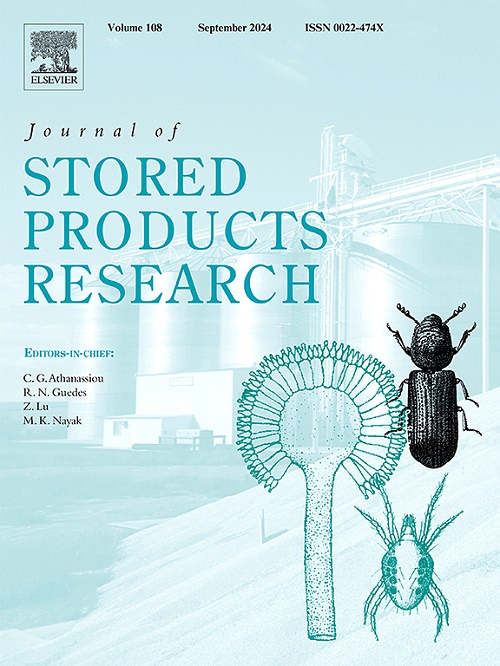Comparative efficacy of Cymbopogon winterianus essential oil and nanoemulsion as a sustainable biopesticide to control Tribolium castaneum: Effect on biomolecules of insect and seed germination
IF 2.7
2区 农林科学
Q1 ENTOMOLOGY
引用次数: 0
Abstract
Tribolium castaneum Herbst is responsible for huge economic losses due to infestation in stored food. Use of conventional insecticides caused resistance development, human health risks and environmental pollution. Investigation of new sustainable and ecofriendly approaches including use of essential oil and nanoemulsion are required. The study designed to compare the effectiveness of Cymbopogon winterianus essential oil (EO) and nanoemulsion (NE) against 4th instar larvae and adult beetles of T. casteneum. The LC50 of NE and EO was (275.01 and 491 ppm) against 4th instar larvae and (26.01 and 68.92ppm) against beetles, respectively. The toxicity of EO was boosted twice by preparing NE. The GCMS analysis of EO revealed the presence of citronellyl butyrate, citronellal, citronellol and D-limonene. The effect of LC50 of EO and NE on seed germination and LC20 on biomolecules of insect were also investigated. In NE treated seed, no significant difference in germination was observed, while significant reduction in EO treated seed was observed as compared to control group. The concentration of proteins, free amino acids and glucose and activities of trehalase, amylase, catalase, glutathione-S-transferase, and alkaline phosphatase were increased while concentration of glycogen and trehalose and activities of invertase and acid phosphatase of beetles was decreased after NE exposure as compared to control group. In-silico studies showed that limonene and citronellal exhibited the strongest interactions with alkaline phosphatase with binding energy (−5.9 and −5.7kcal/mol), respectively. It is concluded that citronella essential oil is a promising alternative for traditional pesticides in managing store grain insect pests.

求助全文
约1分钟内获得全文
求助全文
来源期刊
CiteScore
5.70
自引率
18.50%
发文量
112
审稿时长
45 days
期刊介绍:
The Journal of Stored Products Research provides an international medium for the publication of both reviews and original results from laboratory and field studies on the preservation and safety of stored products, notably food stocks, covering storage-related problems from the producer through the supply chain to the consumer. Stored products are characterised by having relatively low moisture content and include raw and semi-processed foods, animal feedstuffs, and a range of other durable items, including materials such as clothing or museum artefacts.

 求助内容:
求助内容: 应助结果提醒方式:
应助结果提醒方式:


